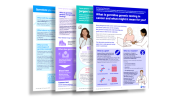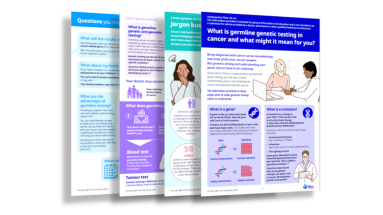Genetic test results and what they mean
What does it mean if I get a positive result?
A positive result means that you have a gene that increases your risk of getting certain types of cancer.1,2 It does not mean that you have cancer, or will definitely go on to get cancer in your life.2
It is normal to feel a mixture of anxiety, worry, anger and guilt. It can be helpful to talk through these feelings with family members, friends or your Genetic Counsellor. This can help you work out what your options are and what is best for you.1,3
If you know you are at a higher risk of getting cancer, you could have check-ups to look for the early signs. Having regular checks can identify signs of cancer earlier and, if there are any signs, it means you can start treatments earlier, which might reduce the risk of it developing further.1,4,5
There are other things you can do to try and stay healthy, for example:6-8
- Eating a balanced diet - aim to have plenty of fruit, vegetables and high fibre foods (wholemeal bread or brown rice and pasta). Limit the amount alcohol as well as high calorie, sugary food and drinks like fast food, chocolate and crisps
- Being active - it’s good to aim for at least 30 minutes of exercise every day. Anything that gets your heart beating faster counts from a brisk walk or cycle, to yoga, dancing or playing sports
- Limiting how much sun you’re exposed to – make sure you wear sunscreen and spend time in the shade
- Stop or cut back on smoking – this is one of the best things you can do for your health. There are lots of resources online or you can get help from your free local stop smoking services
If you have received a positive test result, you may be not sure what happens next.
‘I found out I was a carrier… it was really scary but there were a few options… and I found an incredible community’
Charlie tested positive for a genetic mutation which increased her cancer risk. You can watch Charlie’s full story here.
It is normal to feel overwhelmed and unsure about what to do after getting a positive test result. It is important to know that just because you have a higher risk of getting cancer, it does not mean you have cancer, or will definitely go on to get cancer.2,9
Your Genetic Counsellor will talk to you about the things you may be able to do to reduce your risk of getting cancer.
Regular screening
Screening is a type of test that looks for early signs of cancer in people who don’t have any symptoms Having regular screening can identify signs of cancer earlier and, if there are any signs, it means you can start treatments earlier, which might reduce the risk of it developing further.2
Treatments to reduce your risk of cancer
You may be able to have medication or surgery to help reduce your risk of getting a certain cancer. This will depend on the cancer you are at risk of getting. These treatments can impact other areas of your life, so deciding whether to go ahead with them requires a lot of careful thinking.2
Lifestyle changes
Leading a healthy life can help reduce your risk of getting certain types of cancer. This includes being active, eating a healthy, balanced diet and avoiding spending too much time in the sun or exposed to cigarette smoke.6,7
What does it mean if I get a negative result?
A negative result means you do not have a certain gene that increases your risk of getting certain types of cancer.2 It does not mean that you will never get cancer, as cancer can be due to a number of reasons.2
You may still be eligible for check-ups to look for early signs of cancer even if you’ve received a negative result. This usually only happens when there is a strong family history of certain cancers such as bowel or breast cancer.10,11 Your Genetic Counsellor will discuss this with you.
Even if you have received a negative result, there is still lots you can do to potentially lower your risk of cancer, for example:6-8
- Eating a balanced diet - aim to have plenty of fruit, vegetables and high fibre foods (wholemeal bread or brown rice and pasta). Limit the amount alcohol as well as high calorie, sugary food and drinks like fast food, chocolate and crisps
- Being active - it’s good to aim for at least 30 minutes of exercise every day. Anything that gets your heart beating faster counts from a brisk walk or cycle to yoga, dancing or playing sports
- Limiting how much sun you’re exposed to – make sure you wear sunscreen and spend time in the shade
- Stop or cut back on smoking – this is one of the best things you can do for your health. There are lots of resources online or you can get help from your free local stop smoking services
If you have any questions, speak to your GP or genetic counsellor who will be able to give you more guidance. There are also plenty more useful resources on this site to help you navigate genetic testing and what it means for you and your family.
References:
- Macmillan Cancer Support. Genetic testing for cancer. Available at: https://www.macmillan.org.uk/cancer-information-and-support/worried-about-cancer/causes-and-risk-factors/genetic-testing. Accessed: October 2024.
- Cancer Research. Getting your genetic test results. Available at: https://www.cancerresearchuk.org/about-cancer/causes-of-cancer/inherited-cancer-genes-and-increased-cancer-risk/getting-your-genetic-test-results. Accessed: October 2024.
- Macmillan Cancer Support. Genetic counselling? Available at: https://www.macmillan.org.uk/cancer-information-and-support/worried-about-cancer/causes-and-risk-factors/what-is-genetic-counselling. Accessed: October 2024.
- National Cancer Institute. Genetic testing for inherited cancer susceptibility syndromes. Available at: https://www.cancer.gov/about-cancer/causes-prevention/genetics/genetic-testing-fact-sheet. Accessed: October 2024.
- Cancer Research. Genetic testing for cancer risk. Available at: https://www.cancerresearchuk.org/about-cancer/causes-of-cancer/inherited-cancer-genes-and-increased-cancer-risk/genetic-testing-for-cancer-risk. Accessed: October 2024.
- Cancer Research. Causes of cancer and reducing your risk. Available at: https://www.cancerresearchuk.org/about-cancer/causes-of-cancer. Accessed: October 2024.
- Macmillan Cancer Support. Causes and risk factors. Available at: https://www.macmillan.org.uk/cancer-information-and-support/worried-about-cancer/causes-and-risk-factors. Accessed: October 2024.
- Cancer Research. Can cancer be prevented? Available at: https://www.cancerresearchuk.org/about-cancer/causes-of-cancer/can-cancer-be-prevented-0. Accessed: October 2024.
- Macmillan Cancer Support. Family history, genetics and cancer. Available at: https://www.macmillan.org.uk/cancer-information-and-support/worried-about-cancer/causes-and-risk-factors/family-history-genetics-and-cancer-risk. Accessed: October 2024.
- Hemminki K., Eng C. Clinical genetic counselling for familial cancers requires reliable data on familial cancer risks and general action plans. J Med Genet 2004; 41: 801–7: doi: 10.1136/jmg.2004.022731
- Tung N et al. Counselling framework for moderate-penetrance cancer-susceptibility mutations. Nat Rev Clin Oncol 2016; 13(9): 581-8: doi: 10.1038/nrclinonc.2016.90










